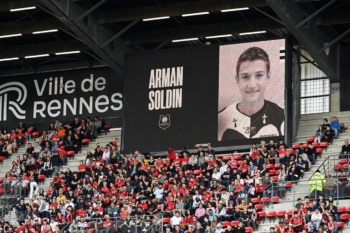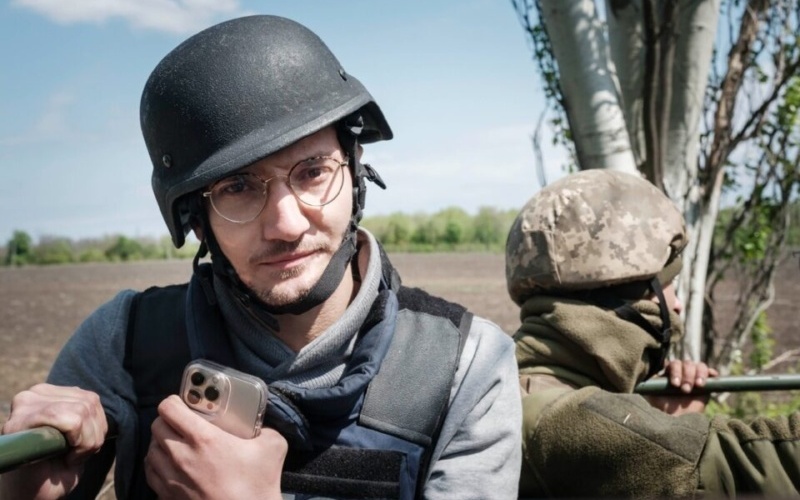Arman Soldin reporting from the Donbas in eastern Ukraine, April 30, 2022 (Yasuyoshi Chiba/AFP)
In April 1992 Sarajevo, the capital of the newly-established Bosnia-Herzegovina, was surrounded by thousands of Bosnian Serb troops. The 47-month siege would be one of the longest in modern history.
Amid the shelling and gunfire which killed 5,434 civilians, a few families were evacuated from the destruction. Among them was the Soldins – Oksana, Sulejman, and their children. In an official plane alongside French President François Mitterand and Health Bernard Kouchner, his Minister of Health, they flew to France. They settled in La Gacilly, a small town in the southeast of Brittany.
Sulejman Soldin said in an interview with local reporter Fañch Gaume, “There is still humanity… The Bretons encourage us to believe in this.”
Arman Soldin avait fui la guerre de Bosnie-Herz. (1992-1995) avec sa famille. Il avait 2 ans lorsque @LesInfosRedon relatèrent leur arrivée en Bretagne. 30 ans plus tard, la guerre l'a foudroyé, en Ukraine. C'est une tragédie sans nom. Un reporter n'est pas une cible. RIP Arman. pic.twitter.com/D5n4kK8fEH
— Fañch Gaume (@FanchGaume) May 12, 2023
In La Gacilly, the 2-year-old Arman Soldin grows up with a passion for football and an ambition to follow the professional path of his parents, TV journalists back in their home city. He travels as a student in London, Lyon, and a return to Sarajevo.
Beginning as an intern at Agence France Presse in Rome, he covers events such as the migration crisis on the Italian island of Lampedusa. He rises to editor in AFP’s London’s offices, but soon comes back to Italy to report on the outbreak of COVID-19. At the same time, combining passion and ambition, he provides commentary on football’s English Premier League for the leading French TV channel Canal+.
Within days of Russia’s invasion of Ukraine in February 2022, he volunteers to go to the frontline. Having fled his home because of the inhumanity of war, he wants to record the humanity of those who are caught in it more than 30 years later.
In Ukraine, he photographs the attacks on and evacuations from Irpin, a suburb overrun by the Russians, in their failed attempt to seize Kyiv. When Moscow’s forces withdraw, he moves his reporting to the Donbas in the east.
Fañch Gaume, the Breton reporter, recalls how his encounter with Arman’s family brought home the realities of a distant and complicated conflict in Bosnia. More than 30 years later, the 2-year-old boy whom Gaume met will be one of those bringing back testimonies from a different remote and dangerous war zone, making sense of a tormented situation.
On May 9, 2023, that child from Sarajevo is killed by a Russian-fired Grad rocket in Chasiv Yar, west of Bakhmut in eastern Ukraine, as Arman Soldin covers the longest battle to date in Russia’s aggression.
“A True Sun”
When AFP officially announced Arman’s killing on May 9, the French political class — the Président, party leaders, and MPs —expressed their condolences. In the Assemblée Nationale, there was a spontaneous ovation. The players and fans of Stade Rennais, where Arman played in youth teams before a knee injury cut short his football career, paid tribute. Beyond France, US White House Press Secretary Karine Jean-Pierre described how “the world is indebted to Arman” and the journalists who had fallen “shining a light on the horrors of Russia’s invasion”.

A tribute to Arman Soldin on the big screen of the Roazhon Park Stadium during the match between Stade Rennais FC and Troyes, Rennes, France, May 14, 2023 (Sebastien Salom-Gomis/AFP)
During a tribute ceremony in Kyiv on May 15, AFP’s global news director Phil Chetwynd explained how Arman was “among the first AFP special correspondents to make it to Kyiv to help” the local team on the ground after the invasion”. His willingness to get as close to events, despite evident dangers, marked his dedication to the journalistic profession. Reporting from Bakhmut, he posted on social media how he experienced “pure terror” while “being caught under a rain of Grad” rockets “exploding less than 50 meters away” during “the longest 30ish seconds” of his life. His colleague Emmanuel Peuchot explained the philosophy of this remarkable endeavour, “Yes, Arman was filming as closely as possible. Because we don’t film the war from afar.”
The praise of his professionalism went hand-in-hand with the testimony about the humanity he brought with him. “Adorable guy”, a person “who loved others”, “a true sun”, “an incredible and vibrant personality”: these were the recurrent phrases from the journalists who knew him.
At the start of May in Chasiv Yar, the place where death would catch him eight days later, he rescued a suffering baby hedgehog. Arman and his colleagues transported “Lucky” in a box recreating his natural environment and fed him with homemade utensils, and came to see this innocent being gaining its livelihood back until it was “running and sniffing everywhere!”.
Sooo.. here is an unusually cute story from our day of reporting around #Bakhmut ! We found a baby hedgehog that was dehydrated and dying at the worst place possible in Chassiv Yar …
Quick thread ! 🧶🧶🧶
1/11 #ukraine #animals @dodo pic.twitter.com/DvTVPnjxh5
— Arman Soldin (@ArmanSoldin) April 28, 2023
The Meaning of Sacrifice
The notion of duty in journalism is central to self-understanding in a democratic society. “He fell because he believed that the duty to inform must not stop at nothing”, Elisabeth Borne, the French Prime Minister, said during the tribute to Arman in the National Assembly on May 10.
Daphné Rousseau, a fellow AFP reporter in Ukraine, explained that Arman was among those journalists who understood the imperative of stemming the “‘tiredness’ of information about Ukraine”. The challenge is to ensure that audiences do not lose their focus on what is at stake — a fight against an authoritarian and destructive war of choice — amid a lengthy conflict and the daily burdens of other developments across the world.
That ambition brought Arman to Bakhmut’s streets, an “artillery hell on earth”. His footage, widely seen and shared, fought against the dystopian war sinking into a landscape of the “normal”. But still, a year after entering Ukraine alongside some of his colleagues, “he was wondering why he was going this far when we see an interest that decreases, decreases, decreases”. A feeling of powerlessness was in tension with an “unwavering commitment” that he maintained throughout difficult times.
#AFP Yesterday, we tried to get as close as possible of the main bridge of Bakhmut as the city is being constantly shelled. Special forces running the street. North, east and sout part of the city seem like artillery hell on earth. Sound on !
1/8#ukraine #bakhmut pic.twitter.com/xFJlaHq8s6
— Arman Soldin (@ArmanSoldin) February 2, 2023
From Sarajevo to Bakhmut, Arman was pursuing liberal values of journalism in a world marked by illiberal mistrust and disinformation. The Russians who eventually killed him were surfing on the detritus, deploying their skills in the use of falsehoods from official statements to troll farms.
AFP’s Phil Chetwynd reminded the audience in his tribute, “At a time when populism and dictatorship are fuelling distrust in journalism, we should all be moved by Arman’s story”. That tale “from civil war Bosnia to the trenches of Ukraine is a powerful antidote to the cynicism” targeting journalists, and nurturing in every layer of society. His work on the ground was a breeze dissipating the thick brewed from ill-informed comments and the propagandist’s fake news. It is the reason why his death resonated from France to the Idlib region in Syria: Arman’s smile is painted on a mural painted on the ruins of Binnish, an area that suffered the violence of Bashar al-Assad’s deadly repression and the lies accompanying it.
فنانون سوريون يرسمون غرافيتي على جدار مدمر في بلدة بنش بمحافظة إدلب شمال غرب سوريا تكريماً للصحفي في وكالة فرانس برس #أرمان_سولدين الذي قتل شرق #أوكرانيا قبل أسبوعين
📸 عمر حاج قدور / وكالة #فرانس_برس @AFPar #AFP pic.twitter.com/0xHcrVH1gp
— Omar Haj Kadour (@omar_hajkadour) May 23, 2023
On May 8, Arman reported on an emergency surgery near the battle for Bakhmut — “Deep inside the wound, the Ukrainian soldier’s heart is still beating.” He quoted the surgeon:
On some days there are 100 wounded, other days 50 or 60. It’s very difficult for our guys there. I can’t imagine how it is there. It is terrifying.
Arman also thought of his first home that day, praising an article by The New York Times’ Robert Worth, about Serbia’s leadership and its drug gangs. “Perfect summary of the last 30y in the Balkans!”, he tweeted.
And he took a moment for the humanity that marked his life, from the professional to the personal.
A 7th-grade teacher wrote him on Twitter about his video of Lucky the Hedgehog, “I have owls in my classroom, showing this tomorrow in class!!”
Armin replied, “That’s very heartwarming to hear!”
Less than 24 hours later, his life — but not his legacy — was cut short.
April 2022: Arman Soldin is driving, with AFP colleague Daphné Rousseau in the passenger seat, to the Donbas in eastern Ukraine. He smiles broadly and sways as they sing to Alphaville’s Forever Young.
Hoping for the best but expecting the worst. Are you gonna drop the bomb or not?
Let us die young or let us live forever.
We don’t have the power but we never say never.
Sitting in a sandpit, life is a short trip.


article très intéressant dans la mesure où il nous montre où nous en sommes nous en France avec nos journalistes mainstream où l intelligence et la force de la pensée est totalement absente
La question est pourquoi?
Ce qui est écrit jdans cet article est une réponse en creux:
Les journalistes main stream sont sélectionnés parmi les individus les moins habilités à faire ce travail:formés dans des usines où il n y a rien à apprendre (Iep et écoles de journalisme),recrutés à un âge où ils n ont rien connu où rien traversé hors les bars du XIeme, encadrés par une hiérarchie à la sueur des magnats de la Finance qui possèdent la quasi totalité des journaux français,ils n ont de cesse de quémander une reconnaissance si on leur donne l illusion d une fausse conscience de leur autonomie de pensée dont ils ne disposent pas soit du fait que leur prose est sous la surveillance des intérêts de la hiérarchie financière soit en raison de leur accord avec la pensée ambiante soit du fait qu ils n en disposent tout simplement pas une seule once